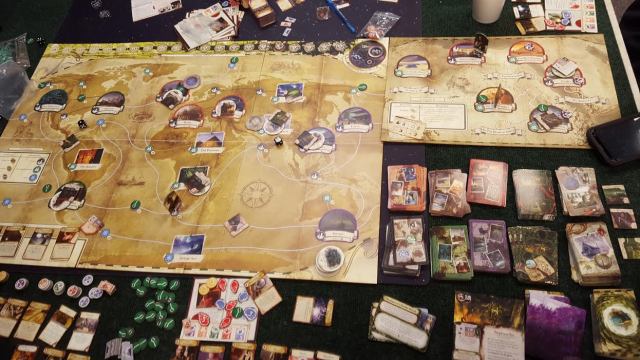Expansion Madness!!
A few weeks ago a new expansion came out for Elder Sign called Omens of Ice. For those not in the know, Elder Sign is a Lovecraftian themed, dice-rolling, cooperative game. This expansion is similar to the last one in that it replaces the museum cards from the original game in favor of a new location with new rules, card, tokens, etc. During the same time one of my friends brought up the idea of having me write about complexity crawl. Complexity crawl is the idea that as a game gets expansions, the rules, interactions, and mechanics of the game increase, thus creating a more complex game. While Elder Signs does a good job of combating complexity crawl by replacing original components when you want to play the expansions, other games do not handle it so well. Today I want to walk through some egregious examples of complexity crawl in games I have played.
Shadows Over Brimstone
Honey! I need the Kickstarter Stretch Goal/Add-on excel sheet again!
Shadows over Brimstone is a Weird Western, dungeon crawl style game from Flying Frog Games. It was on Kickstarter and the stretch goals rival most other miniature Kickstarter games. All of those stretch goals you see became expansions to those who did not kickstart the game. While this game does not necessarily increase its complexity with expansions, the expansions do increase the “shit you have to keep track of” aspect of the game. Each expansion adds not only a few minis but also new item cards and chits. So the complexity here comes from knowing all the components in your game before you sit down to play. The crawl of the complexity literally depends on how much money you are willing to spend since a lot of the expansions are released at once. This game is very much unlike the next game I am going to discuss.
Eldritch Horror

It is a deck lover’s dream! Look at all the decks of cards! LOOK AT THEM!!!
I know that many people will see this and scoff at the fact that Arkham Horror is much worse but I have not played that game, so I am talking about Eldritch Horror. If you are not familiar with the game, check out my many articles on it here. This game has expansions released about once a year. Each expansion offers an integration to the existing game. So when you choose to use an expansion, you pick a related boss monster, or draw the related prelude card (a set-up mechanic), and add the appropriate boards, cards, chits, and pieces to the regular game. However, this game already has a ton of stuff going on so adding another board, 3-5 new decks of cards, and an hour or two of game time can really cause people to second guess playing with any of the expansions. Unfortunately for Eldritch Horrror, this addition of more of what makes the game awesome is not always a good thing. The implementation of staging expansions is a good thing as we have seen with games like Viticulture, with its Tuscany expansion. However the way Eldricth Horror stages the expansions does nothing for people who do not have a lot of experience with the game. So annual staged expansions may seem like a negative thing but they introduce far less complexity than the next game I am going to talk about.
Android: Netrunner

This is a beautiful picture of the neurosis that players of these games suffer from. Embrace the organization.
Netrunner is a living card game from Fantasy Flight Games. I usually write one article a month on LCGs so if you are not familiar with them, check out the breadth of articles here. The idea with LCGs is that you get monthly expansions as part of a thematic cycle. This happens over 6 months or so until a deluxe expansion comes out with a bunch of new cards! The heavy focus on expanding the game is much like Magic the Gathering’s blocked booster sets. However, with LCGs, you already know all the cards you are getting and it isn’t random, but before I got off on a tangent as to why the LCG model is better than the CCG model, I want to discuss why this expansion model is being talked about here. While I love getting new cards every month, it also turns complexity crawl into a complexity full-on sprint. If you leave these games for even a few months, you will be missing out on a ton of new mechanics, and that can kill a game for some people. The only real way to fight this is to keep playing the games, but it means you cannot focus on a lot of other things. I am finding myself in this situation right now haha.
I know this may seem like a negative article but it is more of a warning about expansions for both customers and development teams. Expansions are great but make sure that as a customer you know what you are getting into and as a developer you are making expansions with the intent of adding to the experience of the game and not to the amount that needs to be stored. Thanks for reading, I’ll see you next week!
-Kyle
